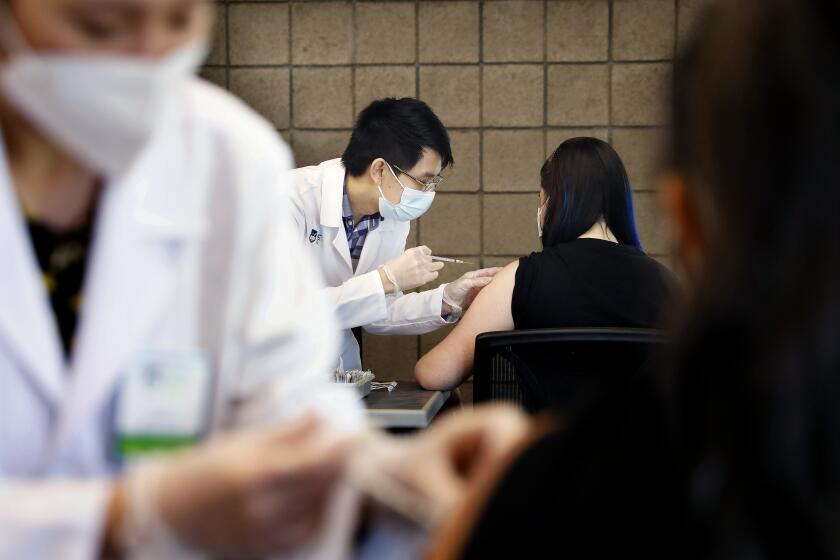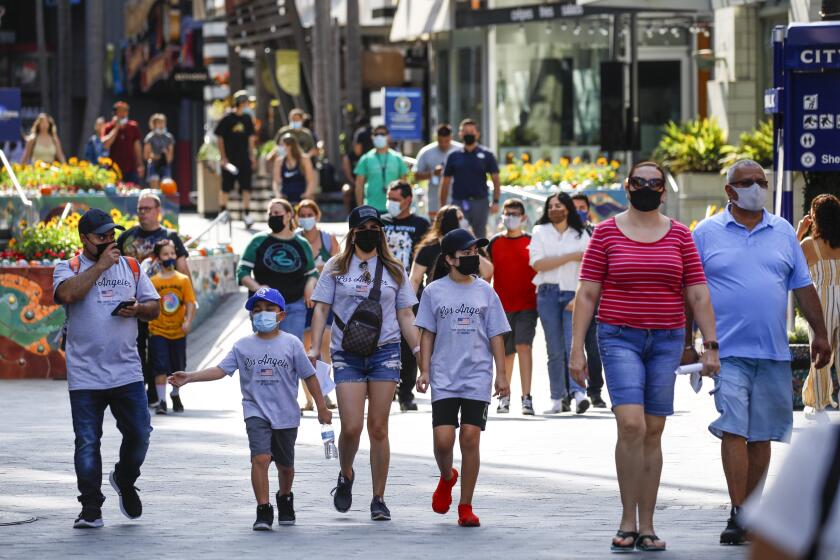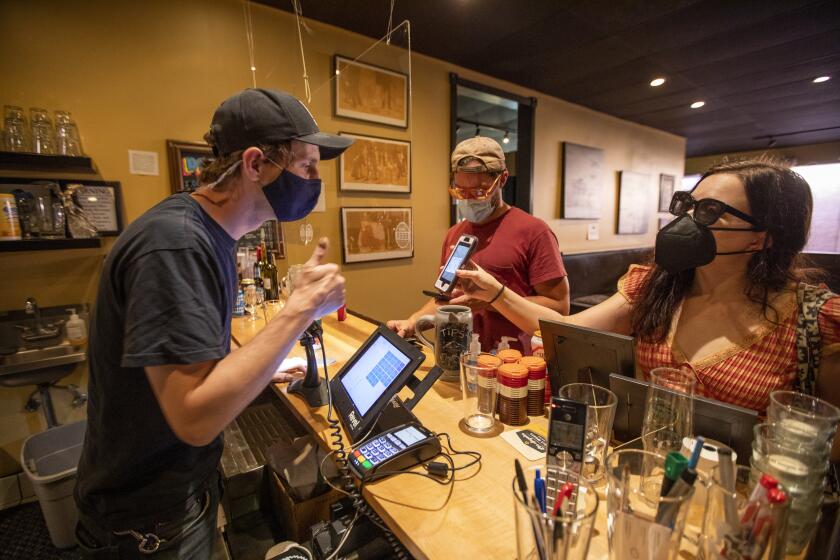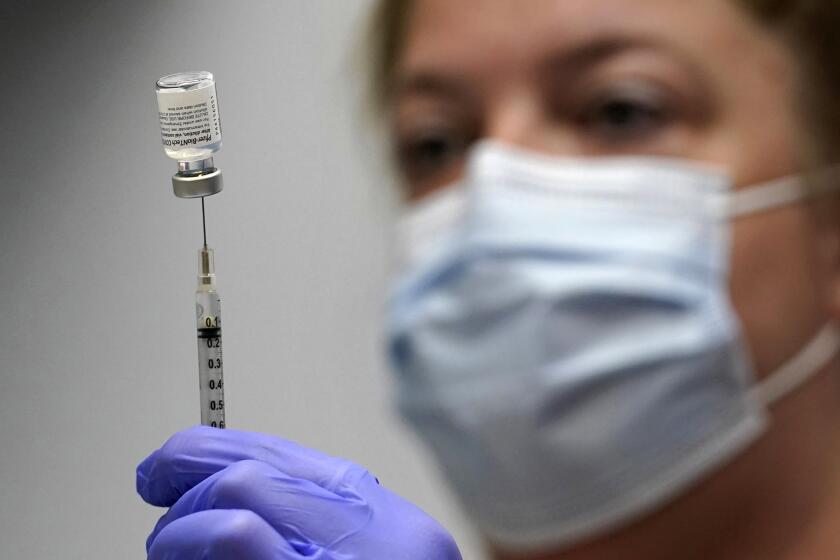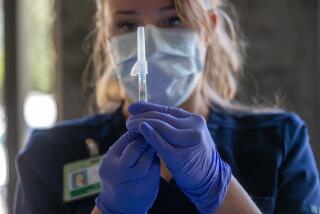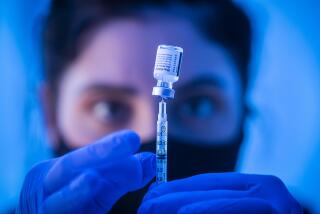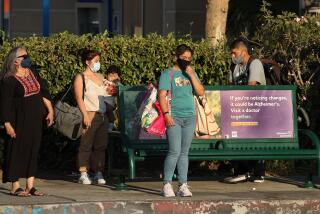COVID-19 cases are falling. So why is L.A. imposing vaccine rules at bars, theme parks?
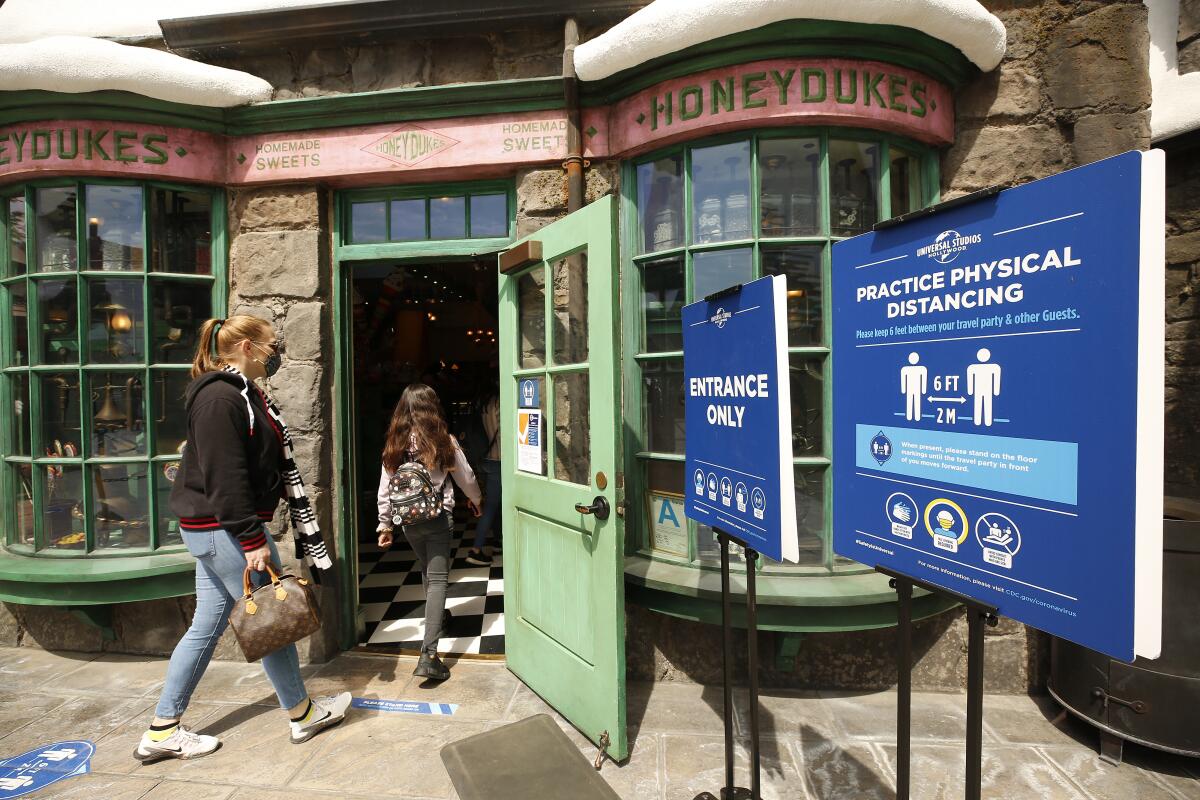
- Share via
Even as coronavirus cases fall in L.A. County, health officials this week announced new vaccine requirements for a variety of entertainment and leisure venues.
The steps are prudent, experts say, and aimed at preventing — or at least lessening — an expected fall or winter wave. The arrival of the busy holiday season will bring people together from all over, and colder weather will increasingly push gatherings and recreation indoors, heightening the risk of transmission.
“This is a reasonable path forward that will position us to be better able to break the cycle of surges,” Los Angeles County Public Health Director Barbara Ferrer said this week.
Gov. Gavin Newsom also called for caution this week, despite the improving COVID-19 numbers statewide.
Newsom pointed out that it “was around this time last year we started to see that stabilization and decline as well.”
“We need to be vigilant,” he told reporters. “Of course, the best way to mitigate that ... is to continue our vaccine efforts.”
Regarding L.A. County’s forthcoming vaccine verification plan, Newsom indicated the state has no immediate plans to adopt a similar tactic, but said “if this encourages more people to get vaccinated, then I believe it’s the right thing to do, and I continue to encourage others to follow that path.”
The pace of COVID-19 vaccinations in Los Angeles County is so slow that there’s a risk of a “cycle of repeated surges every few months,” Los Angeles County’s public health director warns.
The primary thrust of the effort is to boost L.A. County’s vaccination rates.
About 67% of Angelenos already have been at least partially inoculated against COVID-19, according to The Times’ tracker.
But that’s still below the level of vaccine coverage necessary to break the chain of coronavirus transmission, officials and experts say. And the recent pace of inoculation has been so slow that there’s a risk of a “cycle of repeated surges every few months,” Ferrer warned this week.
The pace of shots going into arms quickened in late July and early August as the effects of the current Delta-variant-fueled surge became apparent, but that boost in weekly vaccinations has started to fade, according to data from the county Department of Public Health.
“In order to avoid a cycle of repeated surges every few months, we’ll need to see a significant increase in vaccination coverage,” Ferrer said.
Under a new L.A. County health order set to be issued this week, such verification will be necessary for attendees of large theme parks and outdoor “mega events” — those with 10,000-plus attendees — starting Oct. 7.
Theme parks
The basics
Under a new health order expected to be issued Friday, verification of a COVID-19 shot or a negative test will be necessary for attendees of outdoor “mega events” — those with 10,000-plus visitors — in L.A. County starting Oct. 7.
While that covers periodic happenings such as conventions, concerts and sporting events, the California Department of Public Health also has extended that definition to include amusement and water parks.
In L.A. County, that means Universal Studios Hollywood and Six Flags Magic Mountain could be subject to the test-or-vaccine verification requirement.
“It’s only for those theme parks that have over 10,000 visitors. For parks that are smaller, they will not be covered by this,” Ferrer said during a briefing Thursday.
According to a 2020 study by the engineering firm Aecom, Universal Studios Hollywood averages about 25,000 visitors per day while Magic Mountain averages 9,900 per day.
It was not immediately clear whether the county would use a park’s daily attendance or its operational capacity to determine whether the new rules will apply. County health officials said more information would be provided at a briefing Friday afternoon.
Comparisons
L.A. County’s requirements will go beyond those outlined at the state level. The California Department of Public Health recommends, but does not mandate, that attendees of outdoor mega events show proof that they’ve recently tested negative for COVID-19 or have been fully vaccinated.
However, the state does require such verification for indoor events with at least 1,000 people.
A new health order will require proof of COVID-19 vaccination to enter indoor bars, wineries, breweries, nightclubs and lounges in Los Angeles County.
Bars, nightclubs
Indoor bars, wineries, breweries, nightclubs and lounges in much of Los Angeles County will also require proof of COVID-19 vaccination under the new health order.
The mandate will require patrons and employees to have at least one vaccine dose by Oct. 7 and be fully vaccinated by Nov. 4.
The order would affect all areas of Los Angeles County except Long Beach and Pasadena, which have their own public health departments.
While a Pasadena spokesman said the city is “waiting to review the health order to determine how we’ll move forward,” officials in Long Beach already have decided to align their local rules with the county’s.
Comparisons
L.A. County is far from alone in employing business vaccine verification as a new tool in the battle against COVID-19.
San Francisco and Berkeley require customers 12 and older in indoor restaurants, bars and gyms to show proof of a COVID-19 vaccination. Contra Costa County, the Bay Area’s third most populous, has ordered customers of those businesses to show either proof of vaccination or a recent negative coronavirus test result.
Palm Springs and neighboring Cathedral City have ordered patrons 12 and older to provide proof of COVID-19 vaccination or a recent negative coronavirus test to enter indoor restaurants and bars.
The panel approves a COVID booster shot plan for high-risk Americans after rejecting a more sweeping proposal.
Indoor restaurants
L.A. County’s new health order will not extend to restaurants, though health officials are strongly recommending vaccination verification at indoor portions of those businesses.
The county’s standing requirement that residents wear masks in indoor public settings will remain in place, according to Ferrer.
More to Read
Sign up for Essential California
The most important California stories and recommendations in your inbox every morning.
You may occasionally receive promotional content from the Los Angeles Times.
